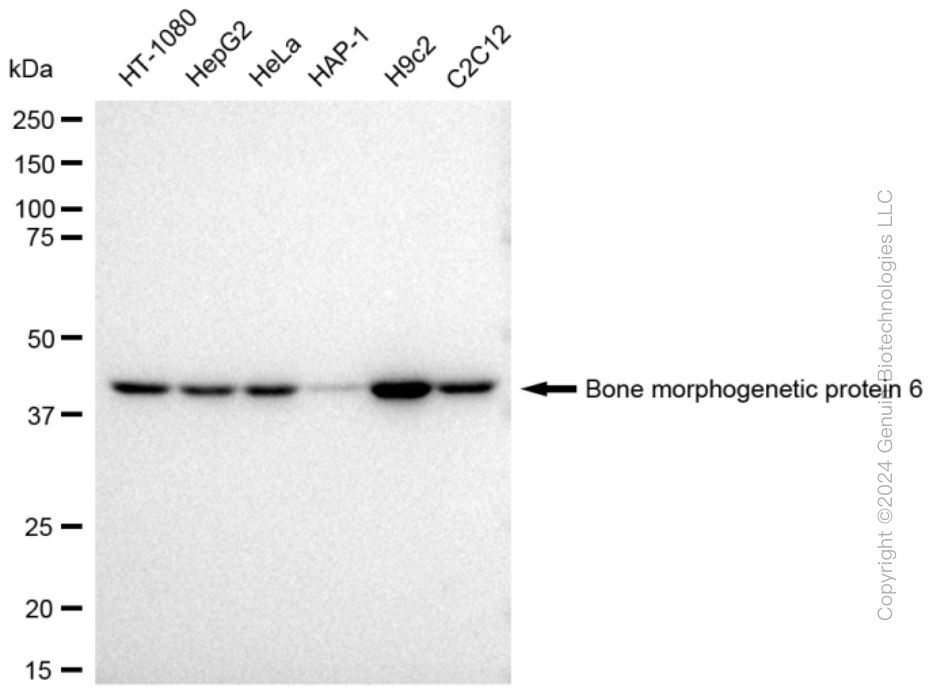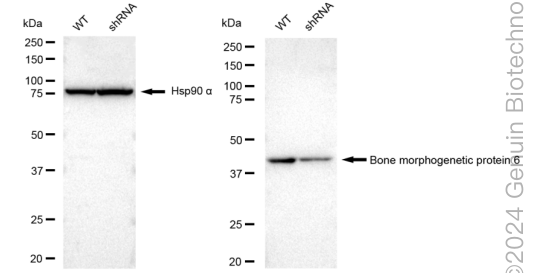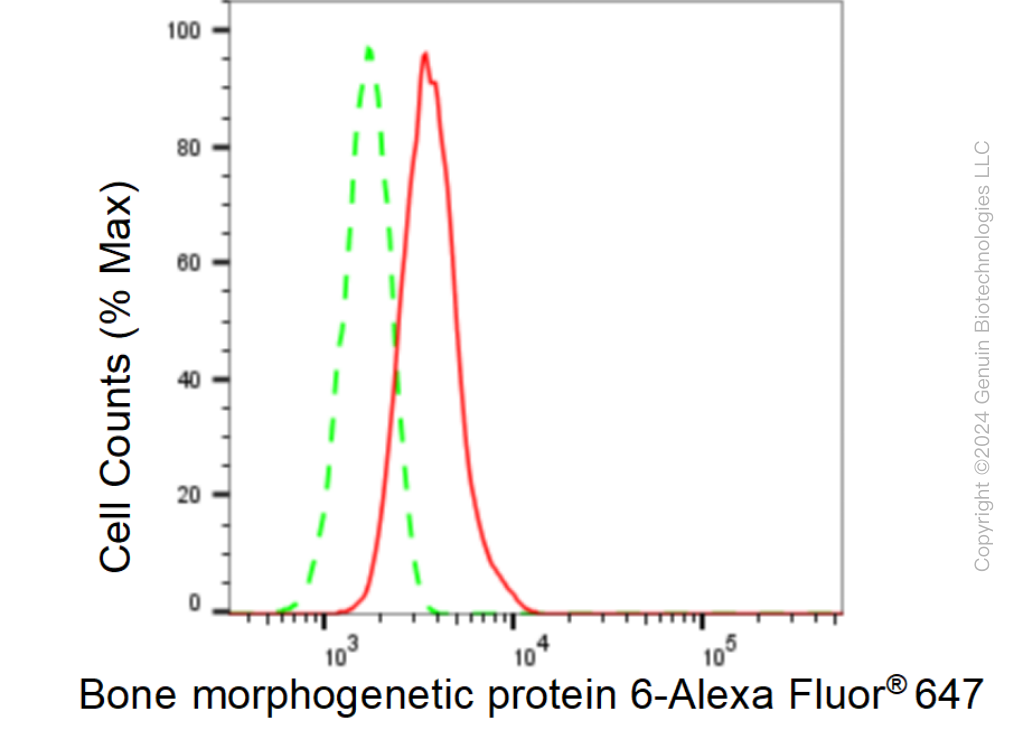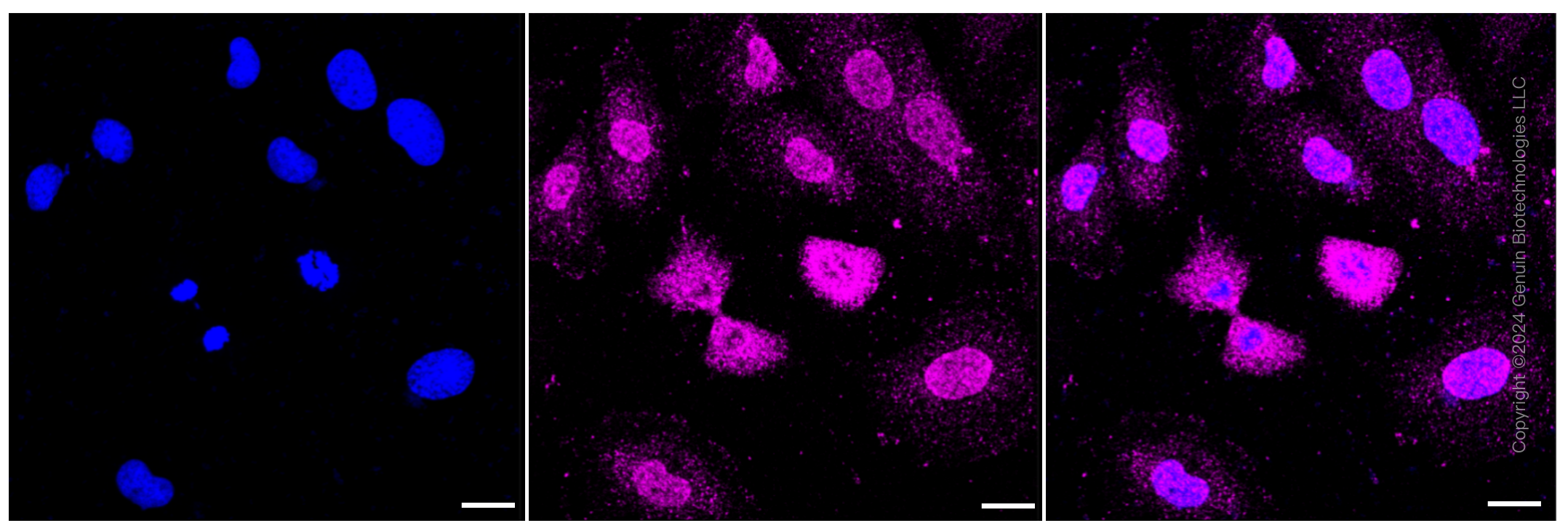KD-Validated Anti-Bone morphogenetic protein 6 Rabbit Monoclonal Antibody
Rabbit monoclonal antibody
- SPECIFICATION
- CITATIONS
- PROTOCOLS
- BACKGROUND

Application
| WB, FC, ICC |
|---|---|
| Primary Accession | P22004 |
| Reactivity | Rat, Human, Mouse |
| Clonality | Monoclonal |
| Isotype | Rabbit IgG |
| Clone Names | 23GB3705 |
| Calculated MW | Predicted, 57 kDa ; Observed, 42 kDa |
| Gene Name | BMP6 |
| Aliases | BMP6; Bone Morphogenetic Protein 6; VGR1; VGR; Vegetal Related Growth Factor (TGFB-Related); VG-1-Related Protein; VG-1-R; BMP-6; VGR-1; IO |
| Immunogen | A synthesized peptide derived from human BMP6 |
| Gene ID | 654 |
|---|---|
| Other Names | Bone morphogenetic protein 6, BMP-6, VG-1-related protein, VG-1-R, VGR-1, BMP6, VGR |
| Name | BMP6 |
|---|---|
| Synonyms | VGR |
| Function | Growth factor of the TGF-beta superfamily that plays essential roles in many developmental processes including cartilage and bone formation (PubMed:31019025). Also plays an important role in the regulation of HAMP/hepcidin expression and iron metabolism by acting as a ligand for hemojuvelin/HJV (PubMed:26582087). Also acts to promote expression of HAMP, potentially via the interaction with its receptor BMPR1A/ALK3 (PubMed:30097509, PubMed:31800957). Initiates the canonical BMP signaling cascade by associating with type I receptor ACVR1 and type II receptor ACVR2B (PubMed:18070108). In turn, ACVR1 propagates signal by phosphorylating SMAD1/5/8 that travel to the nucleus and act as activators and repressors of transcription of target. Can also signal through non-canonical pathway such as TAZ-Hippo signaling cascade to modulate VEGF signaling by regulating VEGFR2 expression (PubMed:33021694). |
| Cellular Location | Secreted. |

Thousands of laboratories across the world have published research that depended on the performance of antibodies from Abcepta to advance their research. Check out links to articles that cite our products in major peer-reviewed journals, organized by research category.
info@abcepta.com, and receive a free "I Love Antibodies" mug.
Provided below are standard protocols that you may find useful for product applications.
If you have used an Abcepta product and would like to share how it has performed, please click on the "Submit Review" button and provide the requested information. Our staff will examine and post your review and contact you if needed.
If you have any additional inquiries please email technical services at tech@abcepta.com.














 Foundational characteristics of cancer include proliferation, angiogenesis, migration, evasion of apoptosis, and cellular immortality. Find key markers for these cellular processes and antibodies to detect them.
Foundational characteristics of cancer include proliferation, angiogenesis, migration, evasion of apoptosis, and cellular immortality. Find key markers for these cellular processes and antibodies to detect them. The SUMOplot™ Analysis Program predicts and scores sumoylation sites in your protein. SUMOylation is a post-translational modification involved in various cellular processes, such as nuclear-cytosolic transport, transcriptional regulation, apoptosis, protein stability, response to stress, and progression through the cell cycle.
The SUMOplot™ Analysis Program predicts and scores sumoylation sites in your protein. SUMOylation is a post-translational modification involved in various cellular processes, such as nuclear-cytosolic transport, transcriptional regulation, apoptosis, protein stability, response to stress, and progression through the cell cycle. The Autophagy Receptor Motif Plotter predicts and scores autophagy receptor binding sites in your protein. Identifying proteins connected to this pathway is critical to understanding the role of autophagy in physiological as well as pathological processes such as development, differentiation, neurodegenerative diseases, stress, infection, and cancer.
The Autophagy Receptor Motif Plotter predicts and scores autophagy receptor binding sites in your protein. Identifying proteins connected to this pathway is critical to understanding the role of autophagy in physiological as well as pathological processes such as development, differentiation, neurodegenerative diseases, stress, infection, and cancer.





